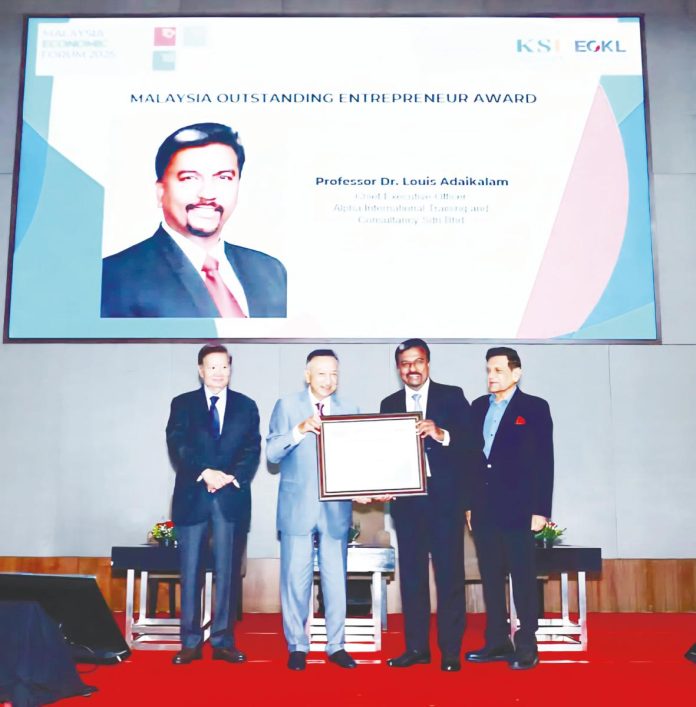KUALA LUMPUR: Alpha International Training and Consultancy is pioneering a transformative approach to workplace well-being – one that sets new global benchmarks, with the company at the forefront of transforming employee health and productivity, both in Malaysia and internationally.
With United Nations approval, the Certified Fatigue and Fitness Accredited Programme, led by Alpha International CEO Professor Dr Louis Adaikalam, is a first-of-its-kind initiative in Malaysia that utilises artificial intelligence (AI) to deliver integrated assessments of sleep, mental health and stress.
By targeting persistent challenges such as presenteeism, absenteeism and rising medical costs, Adaikalam’s vision is not only to make health solutions more compelling for today’s corporate world but also to set a new standard for productivity and employee care in the digital age.
“Sometimes, you must develop truly unique courses to address evolving challenges. That is why my programme – approved by the United Nations and enhanced with AI – is considered one of its kind in the world.
“By leveraging AI, we can not only assess current well-being but also predict potential medical issues that individuals may face in the years ahead,“ Adaikalam told SunBiz.
If left unchecked, he said, these issues can have significant negative consequences.
“However, what sets our approach apart is the integration of cutting-edge technologies available today to address such challenges proactively. For instance, we focus on mitigating risks like microsleep, which is increasingly recognised as a major contributor to accidents both on the road and in the workplace.
“Fatigue and driver fitness are also critical factors that directly impact safety. Our solutions are designed to help organisations and individuals identify and prevent these problems before they escalate,“ Adaikalam said.
Fitness plays a crucial role in preventing accidents, particularly when it comes to microsleep behind the wheel, he said.
“If we can accurately predict a high risk of microsleep while driving, we empower individuals to take proactive steps before an accident occurs. Our approach is to leverage the latest available technologies to develop unique programmes that offer not just prediction, but also targeted rehabilitation and treatment solutions to address these risks effectively.”
On June 24, Adaikalam received the Malaysia Outstanding Entrepreneurs Award 2025 from think tank KSI Strategic Institute for Asia Pacific, which was presented to him by Tunku Datuk Seri Utama Naquiyuddin ibni Almarhum Tuanku Ja’afar, the Tunku Laksamana and former Regent of Negeri Sembilan.
Adaikalam said successful partnerships with government agencies, NGOs and the private sector are essential for promoting Alpha International’s initiatives.
He added that governments across the globe place strong emphasis on collaboration between public and private entities.
“As a foundation for this, we have established partnerships with key organisations such as Malaysia Productivity Corporation (MPC) and Miros (Malaysian Institute of Road Safety Research), an agency under the Ministry of Transport.
“Our approach is to develop programmes that align with government aspirations – for example, working with the Ministry of Transport to reduce road accidents.
“By signing agreements with bodies like Miros and MPC, we create win-win situations where our causes support broader objectives, such as the United Nations’ Sustainable Development Goals, while also addressing social needs,“ he said.
Moving on, Adaikalam said key lessons have emerged from observing widespread challenges, such as micro-sleep and fatigue, issues that affect not just the transport sector but also workplaces across all industries.
He said these behavioural problems are far-reaching and require targeted expertise to address.
Quoting various research, Adaikalam said in the 21st century, another primary concern is the decline in sleep quality and duration among workers, which directly impacts cognitive function and overall job performance.
This trend, he said, is now recognised as one of the most significant workforce challenges, calling for innovative solutions to enhance employee wellbeing and productivity.
“We recognise that insufficient sleep is a widespread issue, with many unaware they are affected. Our programmes don’t simply instruct people to sleep more; instead, they educate on how fatigue accumulates and its impact, such as impaired cognitive function, reduced focus and increased workplace errors.
“Given that findings show nine out of 10 Malaysians experience sleep problems – whether through deprivation or disorders – addressing this is essential for both individual well-being and organisational productivity,“ Adaikalam said.
Malaysia has reported to the World Health Organization (WHO) that the economic burden of disease in the country amounts to about RM100.79 billion.
A significant contributor to this high burden is inadequate sleep among the population, which leads to various health issues such as diabetes, hypertension, and other chronic conditions. Additionally, mental health-related costs account for an estimated RM14.6 billion, compounding the national challenge.
The WHO data also reveals that about one in three Malaysians experiences mental health problems.
These findings underscore the critical importance of addressing behavioural change – particularly concerning sleep and well-being – to reduce the overall burden of disease and improve public health outcomes in Malaysia.
“By 2030, Malaysia will be an ageing society, making it vital to educate people now on the importance of sleep, fitness, and fatigue management.
“These issues are directly linked to reducing the future burden of disease. If proactive steps are not taken, the consequences for public health and government resources could be severe, even leading to unsustainable costs.
“That is why our training initiatives are designed not only to build healthier individuals, but also to support government efforts in safeguarding the nation’s well-being,” Adaikalam said.








